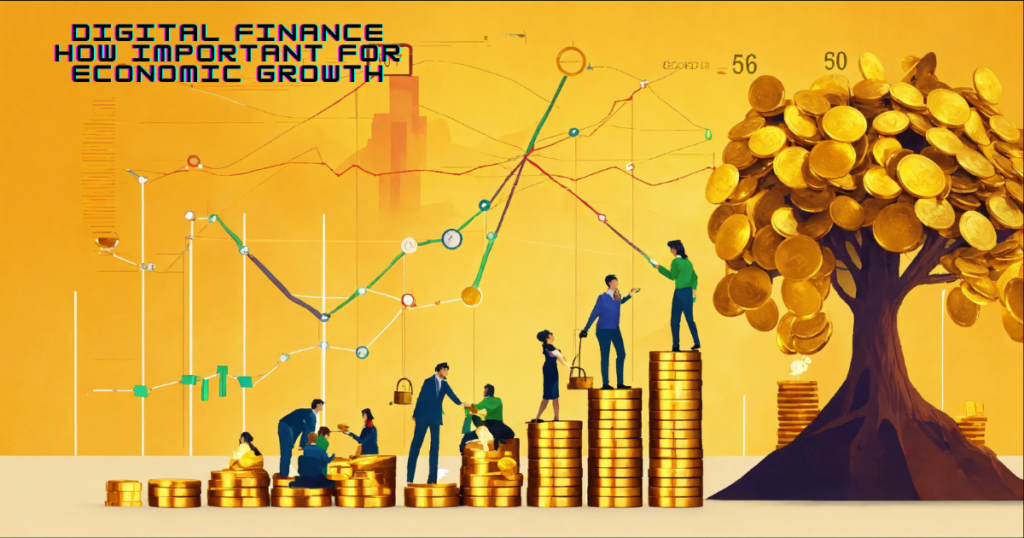In an era where technology permeates every aspect of our lives, digital finance emerges as a powerful catalyst for economic growth. From mobile banking apps to blockchain-based transactions, the digital revolution is reshaping financial landscapes worldwide. But why is digital finance crucial for sustainable economic development? Let’s explore its impact, benefits, and the path forward.

Digital Finance: Fueling Economic Prosperity
- 1. Unlocking Financial Inclusion
- 2. Efficiency and Cost Savings
- 3. Access to Credit: Fueling Entrepreneurship
- 4. Transparency and Accountability-Digital Finance
- 5. Job Creation and GDP Boost-Digital Finance: Fueling Economic Prosperity
- 6. Tailored Financial Services
- 7. Fintech Innovation: A Game Changer
- 8. Building Resilience-Digital Finance
- Conclusion: The Path Forward
- Some inspiring digital finance success stories from various sectors
- FAQs
- 1. How Digital Banking Helps Economic Growth?
- 2. Importance of the Financial System for Economic Growth
- 3. Impact of the Digital Economy on Economic Growth
- 4. Why Is Digital Finance Important?
- Disclaimer
1. Unlocking Financial Inclusion
Digital finance bridges gaps, reaching the unbanked and underbanked populations. Mobile phones and the Internet become gateways to essential financial services. Imagine a farmer in a remote village accessing microloans via a mobile app or a small business owner receiving payments seamlessly. Financial inclusion becomes a reality, empowering individuals to participate actively in economic activities.
2. Efficiency and Cost Savings
Traditional banking involves brick-and-mortar infrastructure, paperwork, and lengthy processes. Digital channels disrupt this paradigm. Financial institutions save billions by embracing digital accounts, which are cost-effective to service. Efficiency gains translate into improved profitability and resource allocation.
3. Access to Credit: Fueling Entrepreneurship
Digital finance enables better credit risk assessment. Providers can extend loans sustainably to individuals and small businesses. Entrepreneurs find the capital they need to innovate, expand, and create jobs. Economic growth thrives on this entrepreneurial spirit.
4. Transparency and Accountability-Digital Finance
Digital transactions leave a clear trail. Unlike cash dealings, which are often anonymous and difficult to trace, digital finance enhances transparency. Governments benefit from improved tax collection and reduced leakage in public spending. Corruption diminishes as financial flows become visible.
5. Job Creation and GDP Boost–Digital Finance: Fueling Economic Prosperity
Widespread adoption of digital finance could increase emerging economies’ GDPs by 6 percent—equivalent to adding an economy the size of Germany. This growth potential translates into 95 million new jobs across various sectors. Imagine the impact on livelihoods and prosperity.
6. Tailored Financial Services
Digital platforms allow for personalized solutions. Whether it’s insurance, investment advice, or peer-to-peer lending, digital finance caters to diverse needs. Customization fosters financial resilience and stability.
7. Fintech Innovation: A Game Changer
Fintech companies drive innovation. Blockchain, AI, and mobile payment systems transform the financial landscape. These disruptors create new opportunities for businesses and consumers alike. Imagine seamless cross-border transactions and decentralized finance ecosystems.
8. Building Resilience-Digital Finance
Digital finance enhances financial resilience. During crises, it facilitates remote transactions, ensures business continuity, and supports livelihoods. Imagine a pandemic-stricken world where digital payments keep economies afloat.
Conclusion: The Path Forward
Digital finance isn’t just about transactions; it’s about empowerment, growth, and inclusion. As we navigate the digital frontier, policymakers, regulators, and industry players must collaborate. We need robust cybersecurity, consumer protection, and regulatory frameworks. Let’s harness the potential of digital finance to create a more equitable and prosperous world—one where economic growth is sustainable and accessible to all.

Some inspiring digital finance success stories from various sectors
- Royal Bank of Scotland (RBS):
- RBS moved its finance functions to the cloud, significantly improving the speed of business operations. Strategic models can now be adjusted in minutes, allowing for agility and informed decision-making.
- University of California at Los Angeles (UCLA):
- UCLA is building a digital finance function capable of leading its success over the next 100 years. By embracing cloud-based technologies, UCLA ensures efficient financial management and adaptability.
- Blue Cross Blue Shield of Michigan (BCBSM):
- BCBSM transformed its finance team into business strategists using cloud-based technologies. The team now uncovers new opportunities, contributing to the organization’s growth and resilience.
- Instacart (Online Grocery Delivery Service):
- A move to the cloud gave Instacart the flexibility to report accurate numbers faster. The company’s finance team can now respond swiftly to changing market dynamics and make informed decisions.
- Oracle (High Technology Sector):
- Oracle has reduced time, risk, and errors, by automating manual accounting processes in the cloud, The company can now reconcile global accounts in just hours, enhancing efficiency and accuracy.
- Western Digital (Manufacturing and Data Storage Solutions):
- Western Digital streamlined business operations in the cloud to accommodate growth and quickly onboard acquisitions. The move allowed for scalability and adaptability in a competitive market.
These success stories demonstrate how digital finance, powered by cloud-based technologies, drives business growth, improves efficiencies, and provides a competitive advantage.
FAQs
1. How Digital Banking Helps Economic Growth?
Digital banking plays a crucial role in driving economic growth through several mechanisms:
- Financial Inclusion: Digital banking extends access to financial services, reaching unbanked and underbanked populations. This inclusion empowers individuals and businesses, fostering economic participation.
- Efficiency and Cost Savings: By embracing digital channels, financial institutions reduce operational costs. Efficiency gains translate into improved profitability, benefiting the overall economy.
- Access to Credit: Digital finance enables better credit risk assessment, allowing providers to extend loans sustainably. Entrepreneurs can access capital for innovation and growth.
- Transparency and Accountability: Digital transactions enhance transparency, minimizing corruption. Governments benefit from improved tax collection and reduced leakage in public spending.
- Job Creation and GDP Boost: Widespread adoption of digital banking could increase GDPs, creating new jobs and stimulating economic activity.
2. Importance of the Financial System for Economic Growth
The financial system is critical for economic growth because it:
- Mobilizes Savings: It channels savings into productive investments, supporting capital formation and economic expansion.
- Allocates Capital: Efficient allocation of capital fuels entrepreneurship, innovation, and job creation.
- Monitors Funds: The financial system monitors the use of funds by firms and individuals, ensuring efficient resource utilization.
- Diversifies Risk: It pools and diversifies risk, promoting stability and resilience in the economy.
3. Impact of the Digital Economy on Economic Growth
The digital economy positively affects economic growth by:
- Increasing Productivity: Digital technologies enhance productivity, leading to higher output and efficiency.
- Optimizing Employment Structures: Automation shifts labor demand toward higher-level skills, improving workforce productivity.
- Promoting High-Quality Development: The digital economy fosters effective growth, total factor productivity, and employment opportunities.
4. Why Is Digital Finance Important?
Digital finance, also known as fintech, is crucial for several reasons:
- Efficiency: It streamlines financial processes, reducing manual work and improving quality.
- Inclusion: Digital finance provides access to financial services for the unbanked, promoting economic participation.
- Innovation: Fintech drives innovation, transforming payment systems, lending, and investment.
- Resilience: During crises, digital finance ensures business continuity and supports livelihoods.
In summary, digital finance is a powerful force that empowers individuals, businesses, and economies, driving growth and inclusion.
Disclaimer
This article has been created on the basis of internal data, information available publicly, and other reliable sources to be believed. The article may also include information which are the personal views/opinions of the authors. The information included in this article is for general, educational, and awareness purposes only and is not a full disclosure of every material fact.
All the information on this website i.e. World Virtual CFO – is published in good faith and for general information purposes only. World Virtual CFO does not make any warranties about the completeness, reliability, and accuracy of this information. These are my views for only information purposes. Any action you take upon the information you find on this website (World Virtual CFO), is strictly at your own risk. World Virtual CFO will not be liable for any losses and/or damages in connection with using our website. For details please refer to our disclaimer page.
Dr. Dinesh Sharma is an award-winning CFO and AI strategist with over two decades of experience in financial leadership, digital transformation, and business optimization. As the founder of multiple niche platforms—including WorldVirtualCFO.com—he empowers professionals and organizations with strategic insights, system structuring, and innovative tools for sustainable growth. His blogs and e-books blend precision with vision, making complex financial and technological concepts accessible and actionable.